04 Sep 17 | Press Releases
Index on Censorship abre las nominaciones para el Fellowship de los Premios Libertad de Expresión 2018.
- El Premio Fellowship honra a periodistas, defensores, activistas digitales y artistas que luchan contra la censura globalmente
- Los Fellows recibirán un año de apoyo especializado
- Para nominar visita: indexoncensorship.org/nominations
- Las nominaciones están abiertas desde el 5 de septiembre hasta el 8 de octubre del 2017
- #IndexAwards2018
A partir de hoy, las nominaciones para el Fellowship de los Index on Censorship Premios Libertad de Expresión están abiertas. Ahora en su decimoctavo año, los premios distinguen a los más notables héroes de la libertad de expresión mundial.
Los ganadores anteriores incluyen a Ildar Dadin el destacado activista ruso, que fue liberado de la cárcel mientras estaba nominado, los activistas digitales anónimos GreatFire de China que desde que ganaron han recibido fondos adicionales signicativos, y el músico y activista Smockey que fue apoyado para reconstruir su estudio en Burkina Faso después de que se quemó en un presunto incendio provocado.
El Premio Fellowship busca apoyar a activistas a todos niveles y abarca el mundo con otros ganadores anteriores incluyendo el caricaturista sirio Ali Farzat, la promotora de educación pakistani Malala Yousafzai, el periodista investigador saudí Safa Al Ahmad y la fotógrafa LGBTI sud africana Zanele Muholi.
Index invita al público, a las organizaciones de la sociedad civil, a los grupos sin fines de lucro y organizaciones de prensa para nombrar a alguien, (individuos u organizaciones) que ellos piensen merecen ser premiados y apoyados en su lucha contra la censura en todo el mundo.
Ofrecemos cuatro Premios Fellowship uno en cada una de las siguientes categorías:
- Arte: para artistas de cualquier forma de expresión y productores de arte cuyo trabajo desafía la represión y la injusticia, y apoya la libertad de expresión artística.
- Activista: para activistas y defensores que han tenido un impacto notable en la lucha contra la censura y la promoción de la libertad de expresión.
- Activismo Digital: para usos innovadores de la tecnología para eludir la censura y permitir el intercambio libre e independiente de información.
- Periodismo: para periodismo valiente, resuelto y de alto impacto (en cualquiera de sus formas) que desenmascara la censura y las amenazas a la libertad de expresión.
Como Fellows premiados, todos los ganadores recibirán un año de apoyo directo incluyendo un nivel muy avanzado de desarollo, tutoría, y asistencia de emergencia 24 horas. Los doce meses empezarán con una estancia residencial de una semana en Londres (Abril 2018). Esperamos, durante el curso del año, mejorar significamente el impacto y la sostenibilidad del trabajo del Fellow premiado.
Jodie Ginsberg, CEO de Index on Censorship dijo: “El Fellowship de los Premios Libertad de Expresión no solo resaltan – si no fortalecen – los grupos e individuos que realizan un trabajo valiente y brillante para mejorar la libertad de expresión en todo el mundo. Los Fellows premiados muchas veces tienen que superar inmensos obstáculos y tienen que enfrentarse con mucho peligro solo por el derecho a expresarse. Esta es nuestra oportunidad para celebrarlos.”
“Insto a todos a nominar a su campeón de la libertad de expresión para asegurarse de que su voz sea oída.”
La lista de los finalistas nominados a los premios 2018 será anunciada a finales de enero. Los Fellows serán elegidos por un panel de jueces de alto perfil y serán anunciados en la ciudad de Londres en una ceremonia de gala en abril del 2018.
Para más información sobre los premios y los Fellowships, por favor, póngase en contacto con sean@indexoncensorship.org o llame al +44 (0) 207 963 7262.
04 Sep 17 | Press Releases
Index on Censorship 2018 İfade Özgürlüğü Burslu Ödülleri için adaylık başvurularını başlatmıştır
- Ödüller, dünya çapında sansür ile mücadele eden gazetecileri, eylemcileri, dijital aktivistleri ve sanatçıları onurlandıracaktır
- Burs sahiplerine bir yıllık destek paketi verilecektir
- indexoncensorship.org/ nominations adresinden aday gösterebilirsiniz.
- Adaylık başvuruları 5 Eylül – 8 Ekim 2017 tarihleri arasında açık olacaktır.
- #IndexAwards2018
Index on Censorship İfade Özgürlüğü Burslu Ödülleri için adaylık başvuruları başlamıştır. Bu yıl 18.si düzenlenen ödüller dünyanın en önemli ifade özgürlüğü kahramanlarından bazılarını onurlandıracaktır.
Daha önceki yıllarda kazananlar arasında, kamuoyunda iyi tanınan, adaylığı sonrası hapisten serbest bırakılan Rus mücadeleci Ildar Dadin, bu ödül sonrası önemli ölçüde ek finansal destek alan anonim Çin dijital aktivist grubu GreatFire, kendisi burslu ödül sahibiyken Burkina Faso’daki stüdyosu yanan ve stüdyosunu yeniden inşaa etmesi için desteklenen müzisyen ve aktivist Smockey de bulunmaktadır.
Burslu ödüller, Suriyeli karikatürist Ali Farzat, Pakistanlı eğitim aktivisti Malala Yousafzai, Suudi araştırmacı gazeteci Safa Al Ahmad ve Güney Afrikalı LGBTİ fotoğrafçı Zanele Muholi gibi geçmiş yılların kazananları ile birlikte her seviyede ve dünya çapındaki aktivistleri desteklemeyi hedefliyor.
Index kamuoyunu, sivil toplum örgütlerini, kar amacı gütmeyen grupları ve medya organizasyonlarını, dünya çapında yaptıkları işler ile sansürle mücadele ettiklerine inandıkları kişileri (bireyleri ya da organizasyonları) aday göstermeye davet ediyor.
Dört kategori bulunmaktadır:
- Çalışmaları baskı ve adaletsizlikle mücadele eden ve sanatsal ifade özgürlüğünü destekleyen sanatçılar ve sanat üreticileri için Sanat (herhangi bir dalda).
- Sansür ile mücadele ve ifade özgürlüğünü teşvikte önemli bir etki yaratan aktivistler ve eylemciler için Eylem.
- Sansürün önüne geçmek ve özgür ve bağımsız bilgi alışverişini sağlamak için teknolojinin yenilikçi kullanımı için Dijital Aktivizm.
- Sansüre maruz kalmış, ifade özgürlüğü tehdit edilmiş cesur, geniş çapta etkili ve kararlı gazetecilik (herhangi bir dalda) için Gazetecilik.
Bütün ödül sahipleri bir yıl boyunca 24 saat acil destek ve doğrudan ileri düzey eğitim ve danışmanlık hizmetleri alacak. 12 aylık süreç Londra’da (Nisan 2018) bir hafta misafir edilmesiyle başlayacak. Ayrıca, bir yıl boyunca, ödül sahiplerinin işlerinin etki ve sürdürülebilirliğini önemli ölçüde artırmayı hedefliyoruz.
Index’in CEO’su Jodie Ginsberg “İfade Özgülüğü Ödülleri sadece bir vitrin işi değildir, aynı zamanda grupların ve bireylerin cesur ve muhteşem işler yapmasını güçlendirerek tüm dünyaya ifade özgürlüğünün yayılmasını sağlar. Ödül sahipleri sık sık devasa engelleri aşmak zorunda kalıyor ve sadece kendilerini ifade etme hakkı için büyük tehlikelerle yüzleşiyorlar. Bu bizim onları övmek için sahip olduğumuz bir şans.”
“Kendi ifade özgürlüğü şampiyonunu aday göstermek için sesini kullan – seslerinin duyulmasını sağla.”
2018 ödülleri listesinin son hali Ocak ayının sonunda duyurulacaktır. Kazananlar, kamuoyunda tanınmış panel jürileri tarafından seçilecek ve Nisan 2018’de Londra’da düzenlenecek bir gala töreninde açıklanacaktır.
Ödüller ve burslar hakkında daha fazla bilgi için lütfen sean@indexoncensorship.org ile irtibata geçin ya da +44 (0)207 963 7262 arayın.
03 Sep 17 | Index in the Press
The Council of Europe, the Organization for Security and Cooperation in Europe (OSCE) and the Index on Censorship organization campaigning for freedom of expression have criticized Estonia this week for refusal to give accreditation to three Russian journalists to an European Union ministerial meeting to be held in Tallinn, Postimees said. Read the full article
03 Sep 17 | Index in the Press
The Council of Europe, the OSCE and the Index on Censorship, an organization which campaigns for freedom of expression, have criticized Estonia this week for the country’s refusal to accredit three Russian journalists for an EU ministerial meeting to be held in Tallinn this month, daily Postimees reported. Read the full article
01 Sep 17 | Index in the Press
A recently censored image of a nipple has highlighted a well-known fact, namely that a male nipple is just a nipple, but a woman’s nipple is deviant. Stare directly at them and you shall turn to stone. Read the full article
01 Sep 17 | Events
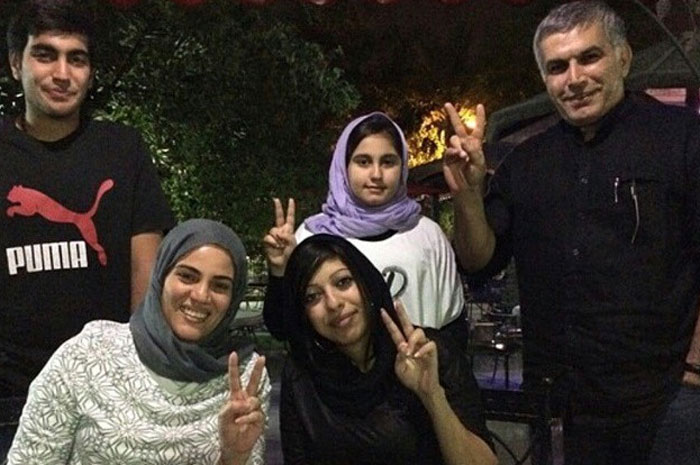
Back Row from left: Adam Rajab, Malak Rajab and Nabeel Rajab. Front Row from left: Sumaya Rajab & Zainab Alkhawaja. (Photo: Adam Rajab)
Join us on 11 September outside the Bahraini embassy in London to mark human rights defender Nabeel Rajab’s latest hearing. If found guilty, he could face up to 15 years in prison for comments made on Twitter. Please join us to show your support for Nabeel and for free expression in Bahrain.
Thank you
Amnesty International Bahrain Team
Bahrain Institute for Rights and Democracy (BIRD)
English PEN
Index on Censorship
Reporters Without Borders
Nabeel Rajab – President of the Bahrain Center for Human Rights, Founding Director of the Gulf Centre for Human Rights, Deputy Secretary General of FIDH and a member of Human Rights Watch’s Middle East Division advisory committee – has for many years been harassed and persecuted for his human rights work.
Last year, on 13 June 2016, Bahraini authorities rearrested Nabeel and began prosecuting him on a variety of charges based solely on his exercise of the right to free expression, including comments he made in tweets and media interviews.
Nabeel’s health declined significantly during more than a year of arbitrary pretrial detention in extended isolation. He was unable to attend his court hearing on 10 July 2017 due to ill health, but was nevertheless sentenced to two years in prison despite his absence, and could still face a further 15 years in prison.
#FreeNabeel
30 Aug 17 | Mapping Media Freedom, media freedom featured, News and features, Turkey
[vc_row][vc_column][vc_column_text]
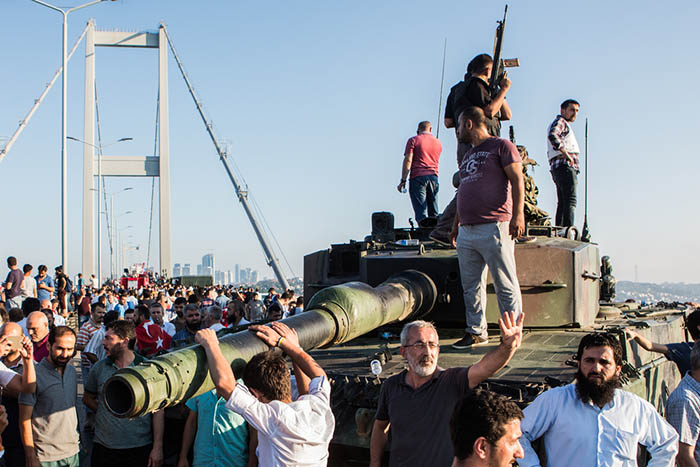
16 July: Violence following attempted military coup. Credit: deepspace / Shutterstock.com
In the year since the failed coup attempt on 15 July 2016, Turkey has cemented its position as the largest jailer of journalists in the world, with around 166 journalists in prison by the end of June 2017.
Many have been accused of being affiliated with terror organisations including the Kurdish PKK, the left-wing DHKP-C and the Gullenist Movement, the group accused of being behind last year’s coup attempt.
This is the case with the 18 writers, cartoonists and executives from the Cumhuriyet opposition newspaper, who went on trial on 24 July, accused of supporting in their coverage these very groups.
Seven of the defendants, including cartoonist Musa Kart, were released under judicial supervision. They must report to the authorities regularly in the lead-up to the next hearing on 11 September.
“The Turkish state’s reaction to the attempted coup on their democratic institutions led to an unparalleled level of attacks on press freedom,” said Hannah Machlin, project manager of Index on Censorship’s Mapping Media Freedom platform. “One year later, the media sphere has been carved out, with hundreds of journalist in jail, being forced to flee or have lost their jobs following the closure of outlets. This trial is clearly political and the state’s attempt to criminalise journalism.”
MMF has been closely monitoring the situation over the last year. Here are some of the more recent cases of journalists being accused of being connected with terrorism.
[/vc_column_text][/vc_column][/vc_row][vc_row][vc_column][vc_separator color=”black”][vc_custom_heading text=”Media freedom is under threat worldwide. Journalists are threatened, jailed and even killed simply for doing their job.” font_container=”tag:h3|text_align:left” use_theme_fonts=”yes” link=”url:https%3A%2F%2Fwww.indexoncensorship.org%2Fnewsite02may%2Fcampaigns%2Fpress-regulation%2F|||”][vc_row_inner][vc_column_inner width=”1/2″][vc_column_text]Index on Censorship monitors press freedom in Turkey and 41 other European area nations.
As of 30/8/2017, there were 521 verified incidents associated with Turkey in the Mapping Media Freedom database.[/vc_column_text][/vc_column_inner][vc_column_inner width=”1/2″][vc_column_text]Index on Censorship campaigns against laws that stifle journalists’ work. We also publish an award-winning magazine featuring work by and about censored journalists. Support our work today.[/vc_column_text][/vc_column_inner][/vc_row_inner][vc_separator color=”black”][/vc_column][/vc_row][vc_row][vc_column][vc_column_text]
On 12 July the Ankara Chief Prosecutor’s office issued detention warrants for 34 former employees of the state-owned Turkish Radio and Television network without providing their names. On 19 July eight former employees were imprisoned under charges of “belonging to a terrorist organisation”.
Media reports said that in Istanbul, warrants to detain 18 people who formerly worked for TRT were issued and that ten of these people were captured. One was released after being interrogated by the police.
The other nine, who were referred to court after their police interrogation, were: reporter Efnan Y, chief technician Faysal A, engineers Serkan C and Özgür Ş, chief technician Satı D, production assistants Şule R, Uğur Y, Tuba E and Yunus G.
Eight of these individuals were put under arrest while one was released under judicial control measures.
On 27 July, Erdoğan Alayumat, a reporter for the pro- Kurdish dihaber news agency, was arrested on terror charges.
Alayumat was detained on 13 July in Gaziantep together with fellow dihaber reporter Nuri Akman, while working on a news report. Later, they were transferred to Hatay province. The two were referred to a court on charges of “membership in a terrorist organisation.”
The court released Akman on judicial probation terms but ruled to arrest Alayumat.
Also on 27 July, the Evrensel columnist Yusuf Karataş was arrested as part of a Diyarbakır-focused operation into the Democratic Society Congress, a union of pro-Kurdish civil society organisations.
Karataş was arrested after visiting the Diyarbakır Police Station for a police interrogation regarding the investigation. He was then referred to a prosecutor, who asked the judges to arrest the journalist.
Karataş was asked questions relating to why he joined a protest of the Roboski massacre – where 34 Kurdish citizens were killed in a bombing by Turkish air force jets in 2011.
On 28 July, two employees of the pro-Kurdish daily Özgürlükçü Demokrasi, Serkan Erdoğan and Özkan Erdoğan, were arrested on charges of “membership in a terrorist organisation” and “conducting propaganda for a terrorist organisation”.
Özkan Erdoğan was initially detained for being in possession of a magazine deemed “illegal” by the Turkish authorities.
Serkan Erdoğan, a reporter for the dailu was detained in a home raid on the same night also in Mersin and later arrested by a Peace Judgeship on the same charges. Reports have said the two Özgürlükçü Demokrasi employees share an apartment, but they are no relation to each other in spite of the shared last name.
On 1 August French journalist Loup Bureau was arrested in Sirnak on charges of being a member of a terror organisation.
Bureau was first detained on 26 July at the Habur crossing, where he was crossing into Turkey from Iraq.
After five days in police custody, he was charged and taken to a prison in the town of Şırnak. A gag order was imposed on his case.
On 18 August Mehmet Sıddık Damar, formerly a reporter for the shuttered news agency DİHA, was arrested in Mardin’s Kızıltepe district over his social media posts.
Prior to his arrest, Damar visited the Kızıltepe Courthouse to testify in an investigation against him.
The court ruled for his arrest on charges of “propaganda on behalf of a terrorist organisation” based on several tweets and social media posts.
Damar was sent to Mardin Prison.[/vc_column_text][/vc_column][/vc_row][vc_row][vc_column][vc_basic_grid post_type=”post” max_items=”4″ element_width=”6″ grid_id=”vc_gid:1504104629275-dd1fbb43-7214-3″ taxonomies=”7355″][/vc_column][/vc_row]
25 Aug 17 | Azerbaijan, Azerbaijan Statements, Campaigns, Campaigns -- Featured
[vc_row][vc_column][vc_column_text]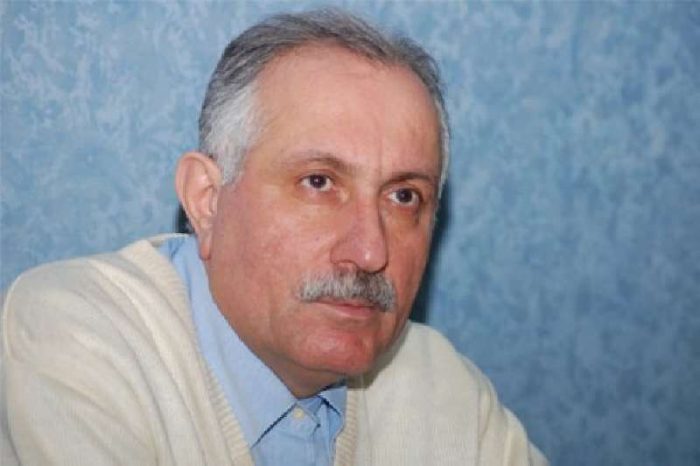
Update: On 25 August Aliyev was sentenced to pre-trial detention. A new charge of illegal entrepreneurship was filed against him, which carries a sentence of up to seven years in prison.
On 24 August Mehman Aliyev, director of independent news agency Turan, was detained and charged with tax evasion and abusing the authorities as part of a wider tax probe against the media outlet. On 23 August Aliyev was called into the state tax department where he was interrogated for eight hours.
“The arrest of Mehman Aliyev and the investigation into Turan have clear political motives. The Azerbaijani government has been exploiting law enforcement agencies to silence criticism and go after independent media,” Index’s head of advocacy Melody Patry said. “We call for the authorities to immediately release Mehman Aliyev and drop all charges against him. The judicial harassment against Turan news agency and its journalists must stop.”
The Azerbaijani authorities have been engaged in efforts to silence Turan news agency for months. On 10 August a tax probe was launched against Turan where the agency is being accused of under-declaring profits since 2014 and faces a fine of over 37,000 manats (€18,000). A week before on 16 August, the state tax department raided the outlet offices and confiscated documents. In April, authorities ruled to block access to Turan website which the courts upheld in May.
Turan has released a statement announcing the indefinite suspension of their work from 1 September as a direct result of blocks on their bank accounts as well as the detention of their director.
According to The Institute for Reporters’ Freedom and Safety, 15 journalists are currently in prison in Azerbaijan.[/vc_column_text][/vc_column][/vc_row][vc_row][vc_column][vc_basic_grid post_type=”post” max_items=”4″ element_width=”6″ grid_id=”vc_gid:1503673643226-8608085a-6298-5″ taxonomies=”7145″][/vc_column][/vc_row]
25 Aug 17 | Digital Freedom, News and features
[vc_row][vc_column][vc_column_text]
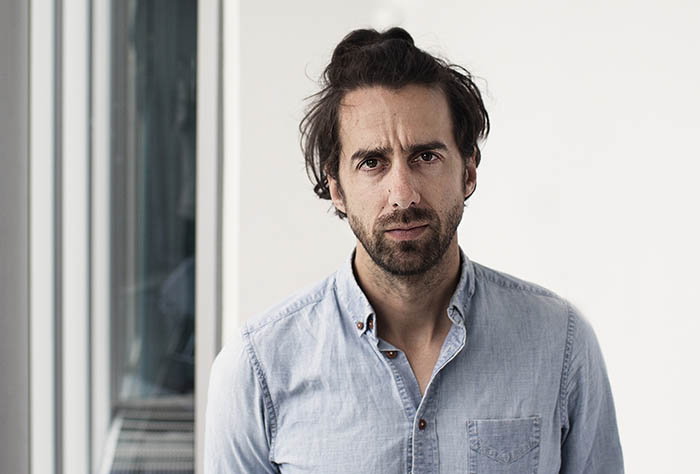
I spend a lot of my time writing about encryption. Until recently I did this from a UK perspective. That is to say, in a country where there are pretty good citizen protections. Despite the occasional hysterical article, the police don’t snoop on you without having some probable cause and a legal warrant. UK citizens aren’t constantly under surveillance and don’t get rounded up for speaking their mind.
From this vantage point, the public debate on encryption starts with its problems. Terrorists are using encrypted messaging apps. Drug dealers are using the Tor browser. End-to-end encryption used by the big tech firms is a headache for local police forces. All this is true. But any benefits are merely addendum, secondary points, “ands” or “buts”. Don’t forget, however, that encryption is also for activists and journalists, including those in less friendly parts of the world. Oh, and don’t forget ordinary citizens. Such benefits are mostly discussed abstractly, almost as an afterthought.
My view on encryption changed in 2016 when I was researching my book Radicals. This being a book about fringe political movements – often viewed with hostility by governments – I expected to use some degree of caution. But it was more than this. Over in Croatia, I was following Vit Jedlicka, the president of Liberland, a libertarian pseudo-nation on the Serb-Croat border. Jedlicka is trying to create a new nation on some unclaimed land that will run according to the principles of radical libertarianism, including voluntary taxation. The Croat authorities do not like him at all, even though he is non-violent and law abiding.
I arrived in Croatia, after an early Easy Jet flight, and was taken aside for questioning by the border police, who appeared to know I was coming. They told me not to attempt to visit Liberland. A little later, while I was away from my hotel, the police turned up and demanded a copy of my passport from the hotel manager. Jedlicka, meanwhile, was barred from entering Croatia, having been deemed a threat to national security.
I did not know a great deal about the Croatian police, but what little I did know made me doubt they cared too much about my right to privacy. I suddenly felt exposed. So Jedlicka and I communicated using an encrypted messaging app, Signal. I had considered Signal mostly a frustrating tool that helps violent Islamists avoid intelligence agencies. But suddenly this nuisance app was transformed. Thank God for Signal, I thought. Whoever invented Signal deserved a prize, I thought. Without Signal, Jedlicka couldn’t engage in activism. Without Signal, I couldn’t write about it.
This was in Croatia. Imagine what that might feel like as a democratic activist in Iran, Russia, Turkey or China.
You see the debate about encryption differently once you’ve had cause to rely on it personally for morally sound purposes. An abstract benefit to journalists or activists becomes a very tangible, almost emotional dependence. The simple existence of powerful, reliable encryption does more than just protect you from an overbearing state: it changes your mindset too. When it’s possible to communicate without your every move being traced, the citizen is emboldened. He or she is more likely to agitate, to protest and to question, rather than sullenly submit. If you believe the state is tracking you constantly, the only result is timid, self-censoring, frightened people. I felt it coming on in Croatia. Governments should be afraid of the people, not the other way around.
The debate on encryption, therefore, should change. The people who build this stuff – whether Tor, PGP or whatever else – are generally motivated by the desire to help people like Jedlicka, people like me. They don’t do it for the terrorists. Seen and understood in that light, the starting point for discussion is about the great benefits of encryption, followed by the frustrating and inevitable fact that bad guys will use the same networks, browsers and messaging apps.
Which is why any efforts to undermine encryption – through laws, endless criticism, weakening standards, bans, threats to ban, backdoors and international agreements – would hit someone like Jedlicka, or me, just as it would Isis. The questions then become: are we willing to prevent good guys having protection just because bad guys are using it? Once you’ve had cause to use it yourself, the answer is extremely clear.
[/vc_column_text][/vc_column][/vc_row][vc_row][vc_column][vc_basic_grid post_type=”post” max_items=”4″ element_width=”6″ grid_id=”vc_gid:1503654311600-41f8449d-cfd3-2″ taxonomies=”6914″][/vc_column][/vc_row]
23 Aug 17 | Index in the Press
Former Sunday Times columnist Kevin Myers has withdrawn from moderating a talk on censorship in Limerick after his appearance in the line-up provoked a storm of “vitriolic” abuse. Read the full article
23 Aug 17 | News and features, Turkey, Turkey Uncensored
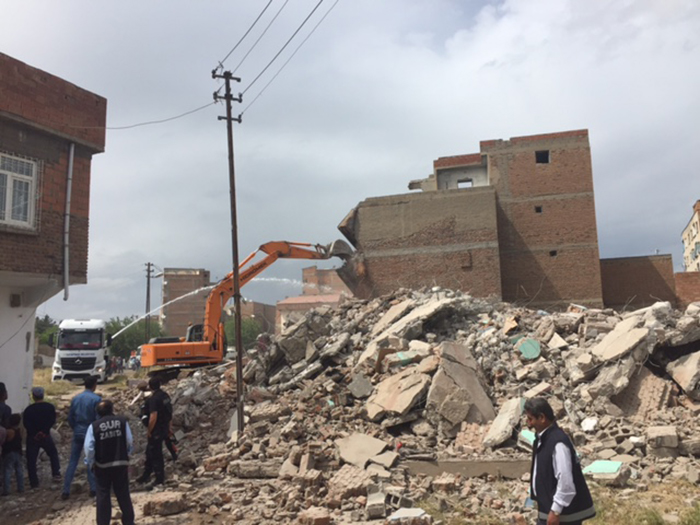
The district of Sur was the first settlement in Diyarbakır, which, according to some sources, has been inhabited for five thousand years and hosted 33 civilisations. The area’s architecture — a rich combination of churches and mosques, mansions and modest homes from different eras — is evidence of its long history and well-established community.
Since June 2016, parts of Sur have demolished as part of an “urban regeneration programme”. In the first stage, homes in the Sur neighbourhoods of Lalebey and Alipaşa were demolished. In the process, the primarily Kurdish communities were destroyed: some families moved away, their connections to their personal history severed; others stayed put, clinging to their homes and their lives in the neighbourhoods with a tenacious resistance to being erased.
The 2016 demolitions were the latest phase in a long process that began in 2009. That’s when the Mayoralties of Diyarbakır and Sur signed an agreement with Turkey’s Environment and Urban Planning Ministry and the Mass Housing Administration to replace the local housing stock with new homes in a style appropriate to the area. Beginning in 2011 with the bulldozing of homes of houses in the Alipaşa neighbourhood, the residents have been at odds with a government they see as inattentive and arbitrary.
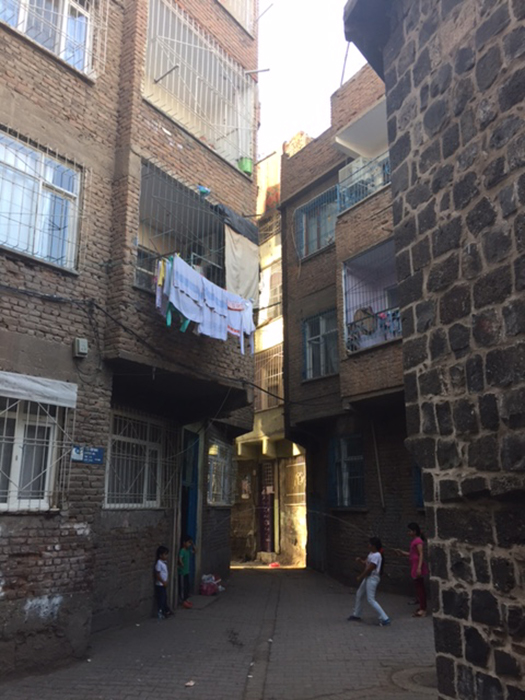
During the 1990s, there were violent clashes between Turkey’s military and armed groups aligned with the Kurdistan Workers’ Party (PKK). Thousands of villages were evacuated by state forces. Displaced people became impoverished when they settled in the city of Sur.
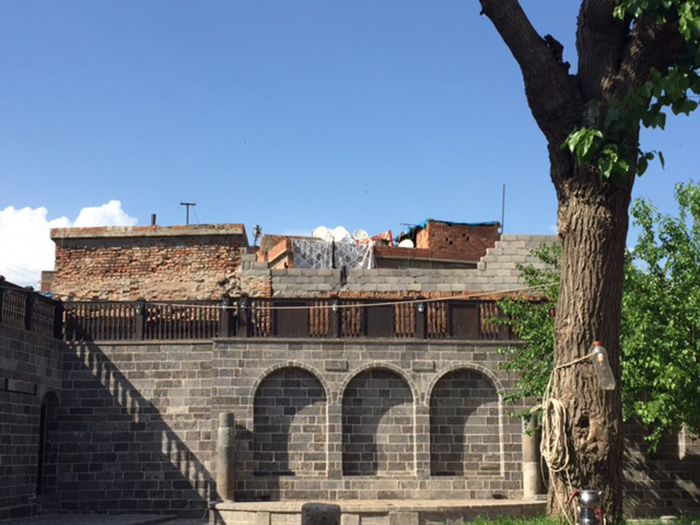
When the displaced began arriving in Sur, new housing was built that quickly overwhelmed the area’s mosque and architecture.
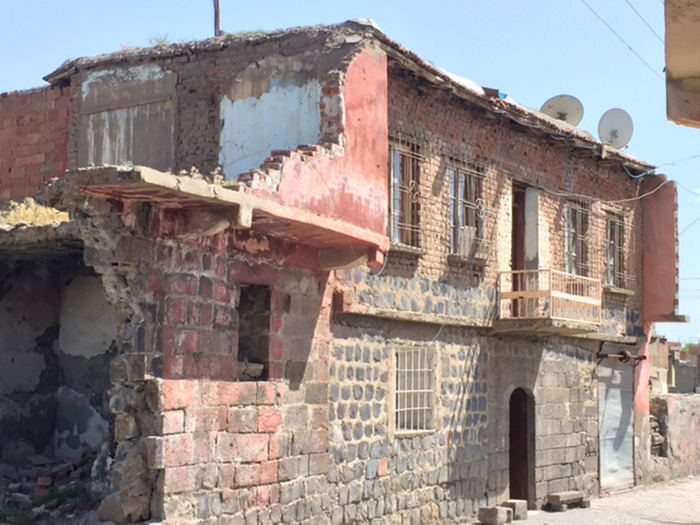
Historic buildings were destroyed in order to build housing for the displaced and the area quickly became a slum. In a short time, some of the new housing became unhealthy and unstable.
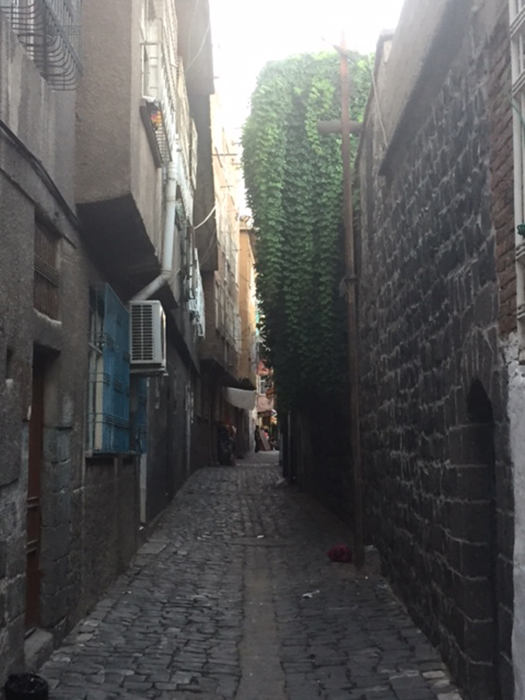
With neighbourhoods of historic buildings, narrow streets and local culture, the city of Sur would have lost these features through its urban regeneration project. Moreover, the money set aside to buy properties was not enough to allow people to start new lives elsewhere. As a result, the local government suspended the project.
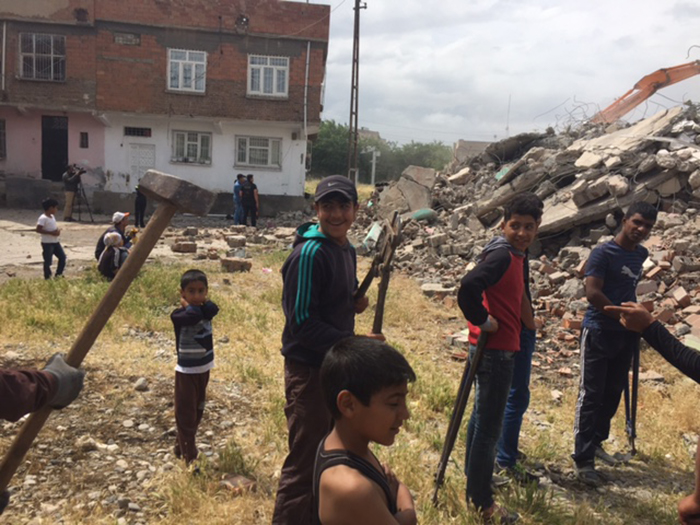
Though the demolitions had been halted because the inhabitants of the area did not want to evacuate their homes and civil society organisations had objected to the destruction of the area’s history and community, an emergency decree issued after the failed July 2016 coup restarted the urban regeneration project.
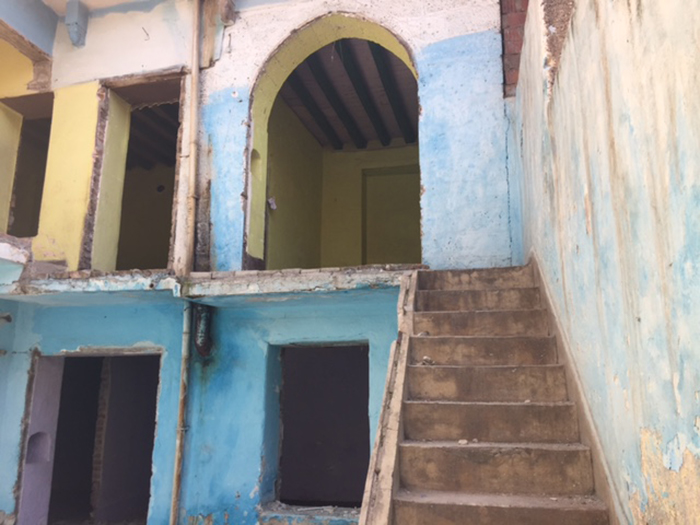
In May 2017, authorities told residents of Sur’s Lalebey and Alipaşa neighborhoods to evacuate their homes. Families that resisted were told they would be forcibly removed. In the face of the threat, some families left the area. Those that remained had their water and electricity turned off.
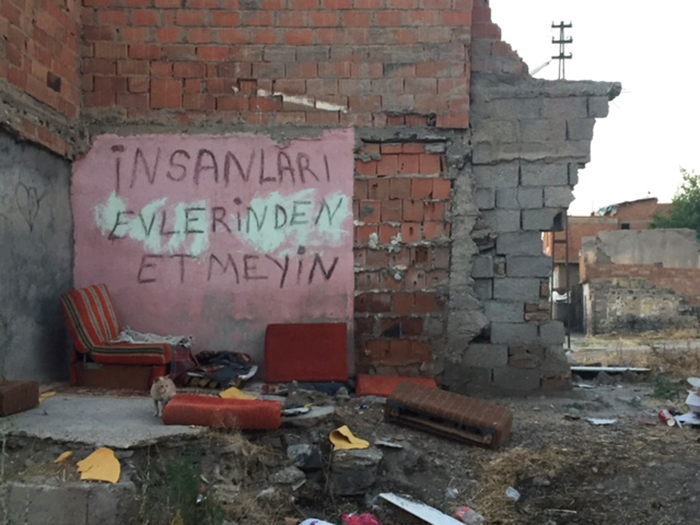
Residents of Lalebey and Alipaşa have used the walls of the neighbourhoods to make it clear they do not want to leave their homes.
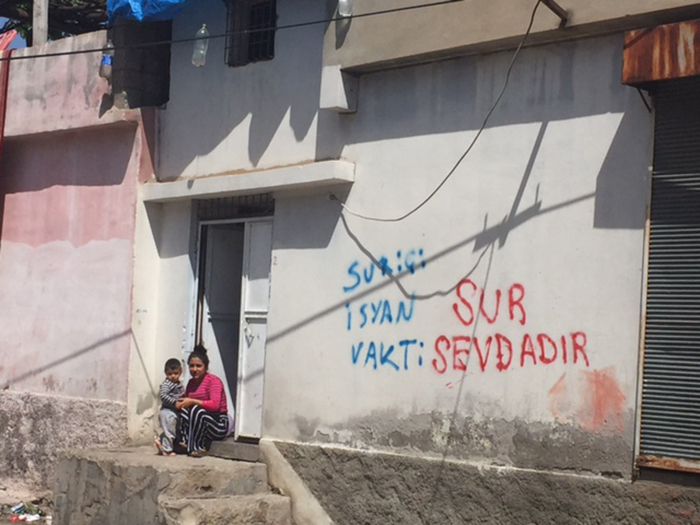
Residents of Lalebey and Alipaşa have used the walls of the neighbourhoods to make it clear they do not want to leave their homes.
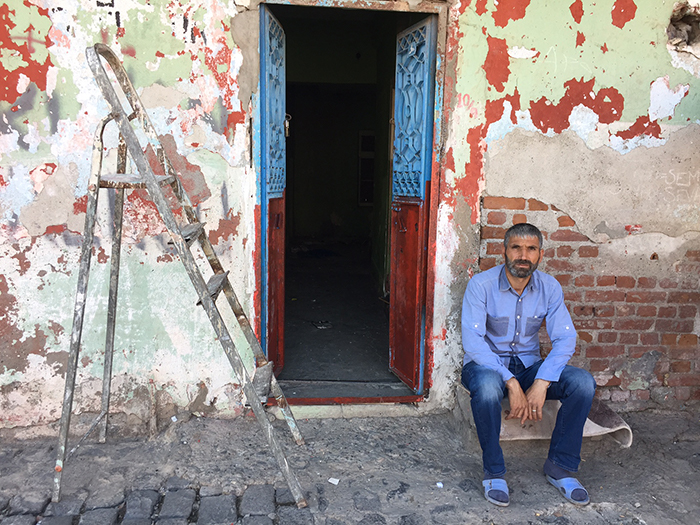
Cumali, sitting in front of his evacuated house, did not want to leave Sur. He has been moved to temporary housing on a road that has not yet been demolished. Cumali says: “I was born in Sur, I grew up, got married. Let us relax. I want to die in Sur.”
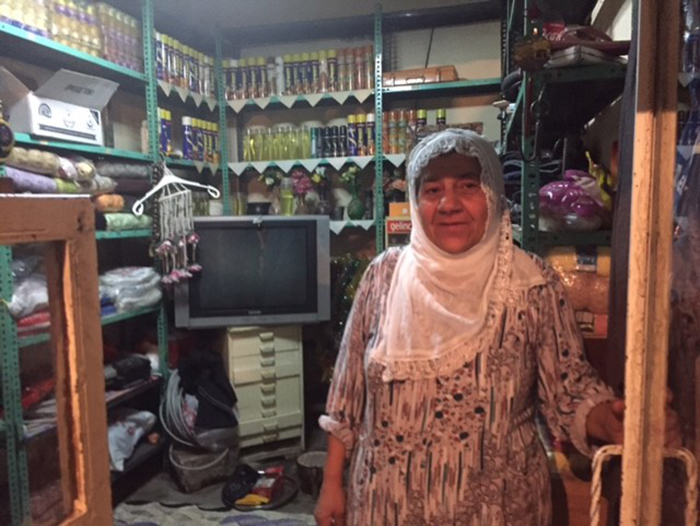
Mevlüde Ak was born and grew up in a house in Sur. She gave her house in Sur to her married, unemployed son. She lives with her husband in their small shop. After closing time, they put down beds on the floor and sleep there. Mevlüde Ak says: “They offered me 60,000 Lira for our house. This money would not be enough for us to buy a new home. We’re not leaving. If they wish, let them bring it down on top of us.”
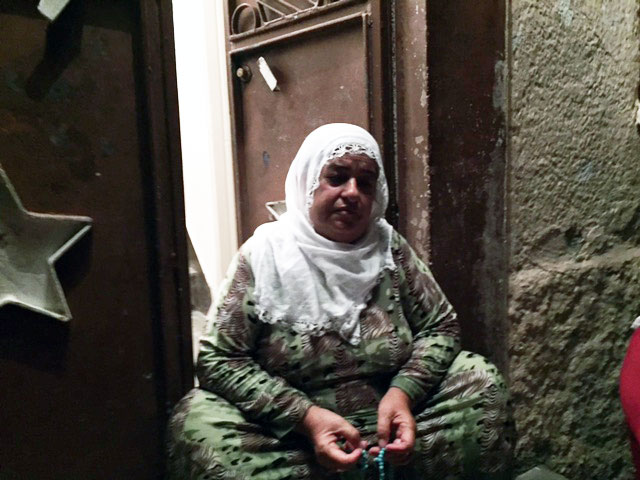
Aynur Güneş’s husband died years ago. She has no children. She lives by selling things like chocolate, gum, crisps in front of her house because it is close to a school. She explains why she does not want to leave Sur as follows: “I know nothing will happen to me here. If something happens: if I fall ill, for example, my neighbours will immediately come to help me. That’s how we grew up in Sur. If I have to live in an apartment I will die.”
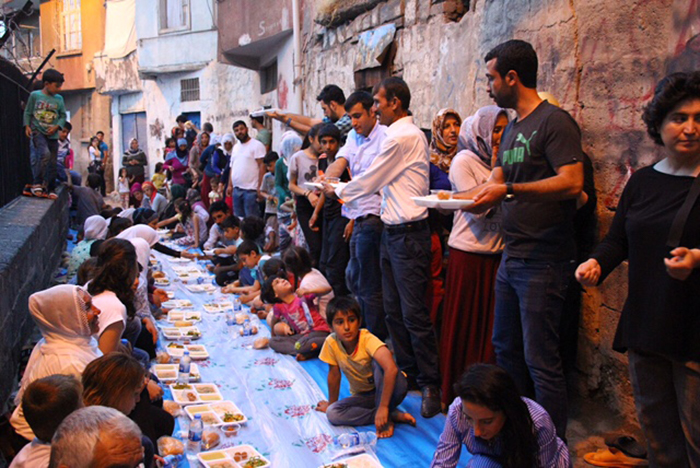
Civil society organisations, supported by artists, journalists and politicians, have banded together with Sur residents to fight the ongoing destruction in the neighbourhoods. The campaign is helping to organise petitions and community gatherings, like this one breaking the fast during Ramadan.
22 Aug 17 | Index in the Press
The International Publishers Association (IPA) has applauded Cambridge University Press’ decision to reverse the censorship of hundreds of articles online from one of its journals, but has also urged Chinese authorities not to punish the press for rolling back on its decision. Read the full article


















